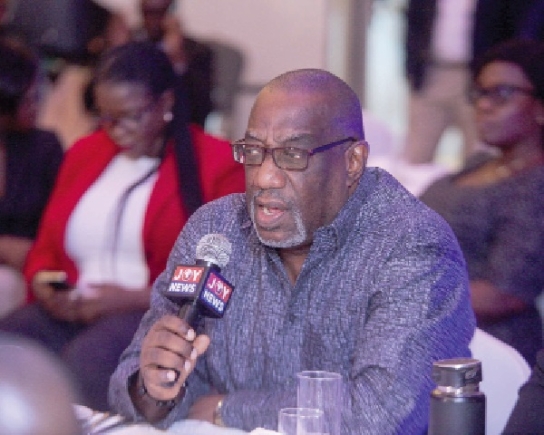“Former Official Advocates for Decentralization of PPPs to Drive Ghana’s Development”

Engineer Philip Lartey, the former Head of Public-Private Partnerships (PPP) at the Ministry of Roads and Highways, has called for the decentralization of PPPs to accelerate Ghana’s development. Lartey, who is now the Chief Executive Officer (CEO) of consulting firm Don Wudi Investment, emphasized the importance of empowering Metropolitan, Municipal, and District Assemblies (MMDAs) to better understand and implement PPPs at the local level.
Speaking at the first quarter of the Graphic Business/Stanbic Bank Breakfast Meeting held at the Labadi Beach Hotel in Accra, Lartey discussed how decentralizing PPPs could drive faster and more efficient development in Ghana. He explained that the concept of PPPs, where the government partners with the private sector to finance and implement development projects, has the potential to significantly contribute to the country’s growth. However, he believes that for these partnerships to be more effective, they must be localized.
Lartey suggested that the Ministry of Finance should focus on building the capacity of MMDA staff, enabling them to better understand how PPPs work and how to implement them at the local level. This, he argued, would help decentralize the process and allow MMDAs to take ownership of development projects. By doing so, MMDAs could partner directly with the private sector without being hindered by the bureaucracy at the national level. He noted that this would lead to quicker project delivery, which is essential for meeting the needs of local communities.
He acknowledged that the government is generally interested in pursuing PPPs, but pointed out that the bureaucratic red tape often slows down the implementation process. Lartey believes that by decentralizing the PPPs, MMDAs could cut through the national-level bureaucracy, ensuring that development projects are completed faster and more efficiently. “The government is interested in doing PPPs, but for faster delivery on government promises, these initiatives need to be localized,” he said.
Lartey also highlighted the challenges the private sector faces when engaging with the government’s bureaucratic system. The long processes involved in dealing with national-level authorities, coupled with the limited four-year political cycles of the government, often delay project execution. Decentralizing PPPs, he suggested, would help overcome these obstacles and ensure that projects are completed in a timely manner, benefiting local communities directly.
One of the key advantages of decentralizing PPPs, according to Lartey, is the increased local ownership of development projects. When MMDAs have more control over projects, they are better able to address the specific needs of their communities. Local ownership ensures that projects are more relevant to the people they serve and that the outcomes align with local priorities.
Furthermore, Lartey emphasized that private sector partners could bring greater efficiency and innovation to development projects. When MMDAs work directly with the private sector, they can benefit from private sector expertise, which can streamline project execution and improve value for money. This collaboration would help ensure that government projects are not only completed on time but also meet high standards of quality.
In conclusion, Lartey stressed that decentralizing PPPs is critical for unlocking Ghana’s development potential. By empowering MMDAs and allowing them to collaborate directly with the private sector, the country can overcome bureaucratic hurdles and achieve faster, more sustainable development. This approach, he argued, would benefit both local communities and the country as a whole.





